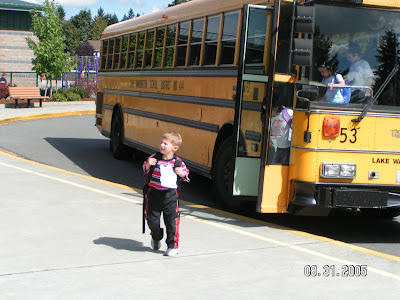“ A mind too vigorous and active, serves only to consume the body to which it is joined. ”
— Oliver Goldsmith
We discovered throughout the kidlet's school years how desperately this child needs to learn. When he was getting ready for kindergarten, I kept telling him how fun it is to learn, and how school is a great place to learn all sorts of things. His face would light up and he would ask all sorts of questions about school with such enthusiasm and excitement that I was thrilled that he seemed to already love school as much as I always did.
The first day of kindergarten was amazing - we waited anxiously for the kindergarten bus to come pick him up in front of our house. We took pictures, and video, and we told stories about school. He wore a red-and-black striped shirt with a huge nametag pinned to it, and his new backpack that was almost larger than he was.
 |
| The kidlet getting off the bus on the first day of kindergarten. |
 |
| Mrs. Cooney welcoming her students on their first day of kindergarten. |
The lack of learning - first in public and then in private - succeeded in exacerbating the asynchronous gap between his intellectual ability and his emotional and social ability. The frustration of not learning was expressed through movement and aggression. His body was being consumed by a mind that was too vigorous for his environment. When we visited a college course, the body stilled as the mind spun into action.
People say to me fairly regularly that they think they can "fix" him with some stern teaching. It makes me grin and wish I could let them try (without damaging my child). The thing is - now that we are homeschooling and he is learning at his own pace, with all subjects being appropriate for his ability - not one of those people would recognize him if they sat in my kitchen during a school day. None of his former teachers would recognize him. None of the people who have made comments about his behavior, or have tried to convince me of whatever pet diagnosis they decide fits him... none of them would recognize him when he is transfixed in the world of science, engineering, or even (finally) math.
“ A mind too vigorous and active, serves only to consume the body to which it is joined. ”
— Oliver Goldsmith
Keep the mind engaged, and the body will follow.







